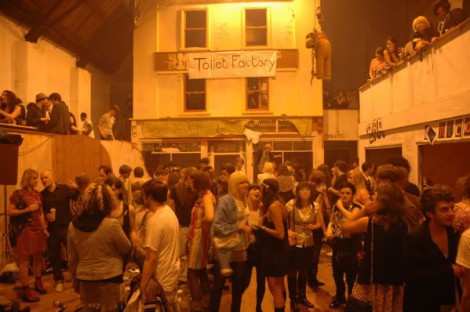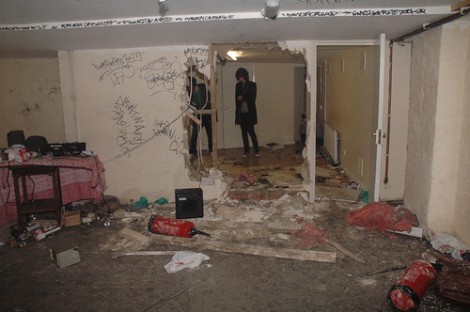All pics @ Slutever + Friends
I receive a lot of emails from people wanting information about squatting: advice on how to squat, what rights squatters have, if squatting requires living in constant fear and pissing into buckets, if I’m looking for a roommate (my favorite). I also get inquiries from people living in countries where squatting is illegal, asking how the fuck I manage to occupy a building that I neither own nor rent without being arrested. In light of this growing intrigue, I decided it was high time to give you all a little overview of what exactly squatting is, and clear up some of the common misconceptions about squat life in the UK and elsewhere. Ahem…
Plainly, squatting is the act of occupying an uninhabited space or building without permission or ownership. Duh. However, the term ‘squatter’ doesn’t solely apply to colorful art students snorting K in disused Toilet Factories in south London. It’s slightly broader than that. In his book Shadow Cities: A Billion Squatters, A New Urban World, author Robert Neuwirth states that today there are one billion squatters globally, meaning roughly one in every six people on the planet. (Check his blog, SquatterCity. It’s cool.) Naturally, the majority of this figure is made up in developing countries, in slums and shanty towns, but the world of squatting is incredibly broad—from the 1,000 people currently squatting the Grande Hotel Beira in Mozambique, to the 900-strong, Danish squat community Christiania, to the 6 million people living on squatted land in Mumbai, and the list goes on. Not to mention all the new-wave squatters who recently jumped on board post Global Economic Whatever. Basically, there are a lot of us.
People squat for many different reasons: necessity, political reasons, because they like the lifestyle, because it makes them seem super cool and edgy (joke?). Personally, I see myself as all of the above. I’ve never felt particularly ideologically driven in my decision to squat. I’ve always just done it because I needed a place to live, and because in my mind paying rent is akin to throwing giant wads of cash out of a moving car. Also, living in London—a city riddled with empty buildings—it seemed silly not to take advantage of my surroundings.
Some nauseating facts for you: In April 2010 an investigation by the Guardian Newspaper found that almost half a million homes are lying empty in the UK—enough to put a roof over the heads of a quarter of the families on council house waiting lists—and that’s not even counting commercial properties. It’s completely ridiculous to think that in this current state people are still homeless.
Jim [no last name offered], a resident of London and a long-time organizer with London’s Advisory Service for Squatters states, “What’s important to understand about squatting here, which is very different from squatting everywhere else in Western Europe, is that mostly it’s about housing—people being angry that they’ve got nowhere to live with buildings standing empty. It is far less overtly political, as in say Germany or Greece.”
If you want to squat, it’s important to remember that each country has its own laws about squatting. Although squatting is legal in England and Wales, due to the Trespass Scotland Act 1865 squatting illegal in Scotland, and is virtually nonexistent. Throughout continental Europe laws and leniency vary from country to country. In Australia it’s possible for squatters to be charged with criminal trespass under the Enclosed Lands Protection Act, but generally squatters are just evicted when discovered. In the United States squatting laws differ depending on state, but for the most part it is rarely tolerated to any degree, particularly in cities. Bummer.
The reason you can get away with squatting in England and Wales is because it’s a civil matter, not criminal matter. Basically this means that squatting is a direct conflict between the squatter and the property owner, and has nothing to do with the police (although moronic cops sometimes need to be reminded of this). The law states that it’s legal to occupy a building as long as you have exclusive access to that property, AKA the keys. These are generally attained by changing the locks when you break—woops I mean move—in. However, if there is evidence of forced entry, then that is regarded as criminal damage you will be arrested. So basically you’re allowed to occupy a building that you don’t own, but you’re not allowed to break into a building that you don’t own, you follow?
Now, I know what you’re thinking: Then how the fuck do I get in? Well, that’s up for you to figure out. I mean, I would never say that you should use a crowbar to jimmy the lock off the door, or check for open windows, or break a window and then repair it immediately after entry, or dress in overalls or a workman’s uniform (or even a suit) during a break-in to appear less conspicuous, because that would all be illegal. And obviously I would never want to encourage anyone to do anything illegal. Cough. Normally, what my friends and I do is hold magic naked rituals outside of a potential property, asking the squat Gods to unlock the doors for us. That normally works. Totally up to you though.
Once you are inside a building, after securing all possible entry points, the next step is sorting out the water and electricity. Sometimes you’ll get lucky and they will already be on. Water, a lot of times, is left on even when a building is not in use. If the water is off at the taps, find the main and turn it back on. If water has been turned off completely then you have to approach the water authority. If the electricity is off, as long as the wiring is OK, you have a legal right to have the electricity connected, but may have to pay a security deposit to the electric company. Or, I mean, you could just squat with someone who is handy at, like, fixing stuff and sorting things out, because I’m certainly not and I’ve managed OK so far.
As for how long you can remain in a squat once you live there, it all depends on how long it takes for the property owner to find out you’re squatting, and how adamant he/she is on kicking you out. In order to be evicted from a squat in the UK the property owner must take you to a civil court. Once court proceedings are under way you normally have about a month before bailiffs will show up and chuck you out. (Not a fun day.) Personally, I lived in one squat for almost three years. I lived in another for less than a week. It’s the luck of the draw, really.
In my six years as a squatter, I’ve learned that one of the most common misconception people have about squats is that they’re free-for-alls where anyone can move in, conditions are unsafe and essentials like water and means to cook are lacking. The amount of times I’ve been asked, “So, do you guys, like, have a toilet?” is just uncountable. Yes, I’m sure these shitholes do exist, but this is not the norm for your average Western squatter. Most squats I’ve been to in the UK and elsewhere have been very clean, communal and friendly. Some you would never guess were squats unless told otherwise. And yes, I know I’ve complained about the debauchery and disgusting nature of Squallyoaks many times over in the past, but that’s just because my squatmates and I are gross. It would be the same even if we paid rent. And to be honest I’m quite comfortable in my own filth so whatever.
Funnily enough, I recently moved back to NYC, which means my squatting days are temporarily on hold. Truth be told I’m really going to miss it-the ridiculous and profoundly beautiful lifestyle that seems to be wholly unique to a squatty existence. It really is like nothing else I’ve ever experienced. Unfortunately, the only squatters I’ve encountered thus far in NYC are either mental anarchists or homeless crack heads. But who knows… maybe I’ll join them. Or maybe I’ll just squat someone’s couch. (More likely.)
Click below to read more Slutever:


